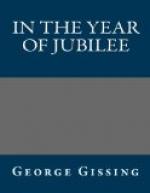There was a silence. Then the young man spoke gravely:
’You are welcome, mother, to half my income. But you must leave me free to marry as I like.’
‘Then I can’t take a penny from you,’ she answered, weeping. ’If you ruin yourself, you ruin me as well.’
’The ruin would come if I married Winifred. I love Fanny; I love her with all my heart and soul, and have never ceased to love her. Tell me what you like about her, it will make no difference.’
A fit of violent coughing stopped his speech; he turned away, and stood by the window, holding his handkerchief to his mouth.
Mrs. Damerel sank upon a chair in mute misery.
CHAPTER 3
Below the hill at Harrow, in a byway which has no charm but that of quietness, stands a row of small plain houses, built not long ago, yet at a time when small houses were constructed with some regard for soundness and durability. Each contains six rooms, has a little strip of garden in the rear, and is, or was in 1889, let at a rent of six-and-twenty pounds. The house at the far end of the row (as the inhabitants described it) was then tenanted by Mary Woodruff, and with her, as a lodger, lived Mrs. Tarrant.
As a lodger, seeing that she paid a specified weekly sum for her shelter and maintenance; in no other respect could the wretched title apply to her. To occupy furnished lodgings, is to live in a house owned and ruled by servants; the least tolerable status known to civilisation. From her long experience at Falmouth, Nancy knew enough of the petty miseries attendant upon that condition to think of it with dread when the stress of heroic crisis compelled her speedy departure from the old home. It is seldom that heroic crisis bears the precise consequence presumed by the actors in it; supreme moments are wont to result in some form of compromise. So Nancy, prepared to go forth into the wilderness of landladies, babe in arm, found that so dreary a self-sacrifice neither was exacted of her, nor would indeed be permitted; she had to reckon with Mary Woodruff. Mary, thanks to her old master, enjoyed an income more than sufficient to her needs; if Nancy must needs go into lodgings,— inevitable, perhaps, as matters stood,—her friend was ready with kind and practical suggestion; to wit, that she should take and furnish a house for herself, and place a portion of it at Mrs. Tarrant’s disposal. To this even Tarrant could offer no objection; he stipulated only that his wife should find a temporary refuge from the home she had occupied on false pretences until Mary had her new house in readiness. This was managed without difficulty. Nancy went to Dulwich, and for several weeks dwelt with the honest woman who took care of her child.
Of the dealings between Nancy and her legal guardians Tarrant learned nothing, save the bare fact that her marriage was avowed, and all benefit under her father’s will renounced. He did not visit the house at Dulwich, and only saw his child after the removal to Harrow. On this occasion he asked Nancy what arrangements had been made concerning the money that must be reimbursed to the Messrs Barmby; she replied that justice would be done, but the affair was hers alone, and to her must be left.




